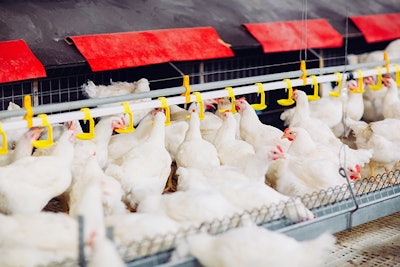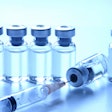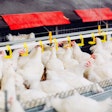
Copper supplementation above the nutritional requirement could help improve broiler performance and health in antibiotic-free production systems.
“In the United States, the vast majority of broilers are fed high levels (125 ppm) of copper for growth promotion. However, evidence is growing that supplementing diets with between 200 and 300 ppm copper has beneficial effects on bird performance when flocks are exhibiting signs of a health challenge like necrotic enteritis. This is especially important in antibiotic-free production systems,” Kurt Perryman, Technical Sales Manager at Micronutrients, said.
Both the broiler and the turkey industries have largely moved away from the use of antibiotics in recent years due to consumer concerns and the rise in antibiotic-resistant bacteria, which can devastate flocks, affect farmer livelihood and make consumers sick if they eat infected meat.
“As a result, companies must explore alternative feed additive products for the maintenance of broiler health and performance in antibiotic-free production systems,” Perryman explained.
How does it work?
Copper offers many benefits, including growth promotion, and is safe to use in broilers, even at high amounts.
“Copper is a required nutrient, and all animals have biological mechanisms to maintain copper homeostasis. These mechanisms limit any potential toxic effects of feeding levels higher than the bird requires. So, while feeding copper at levels 10 times greater than the requirement has a profound effect on bacterial proliferation, broilers do not show overt toxicity symptoms until feeding levels exceed 50 times the requirement,” Perryman added.
Additionally, when fed at higher levels, copper can have bacteriostatic properties – meaning it can prevent bacteria from reproducing, although it doesn’t necessarily kill it.
“Feeding high copper reduces bacterial proliferation by overwhelming the biological mechanisms bacteria typically employ to utilize copper as a catalytic cofactor and structural component of many enzymes necessary for life. Reducing bacteria in the gastrointestinal tract both spares nutrients for the bird as well as limits the risk of pathogenic colony formation,” Perryman said.
Like what you just read? Sign up now for free to receive the Poultry Future Newsletter.

















